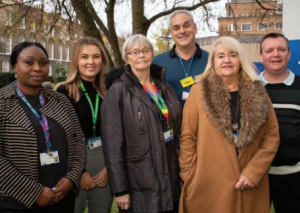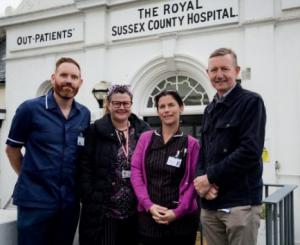
by Eva Morrison
Pathway teams have been profiled in the December 2019 and January 2020 editions of the BMA’s The Doctor magazine; illustrating the work of homeless health interventions in London and Brighton.
These articles are timely, as last year the BMA declared the homelessness crisis a ‘public health emergency’ at its annual representative meeting in June.
The Doctor talked to Pathway clinicians in London, Manchester and Sussex, and made visits to the Royal London Hospital and Brighton teams, witnessing homeless healthcare in action.
“A hospital admission is an amazing opportunity. Someone is in a place where you can help them and where they may want help also. It can be an opportunity to break the cycle,” said Dr Peter Buchman.

The Doctor documents the struggles of staff, patients, and the system – shadowing the work of our teams and other colleagues on the frontline. The demand, and complexity of patients, combined with the lack of ability to make a difference to their homelessness, is growing ever apparent to those working in primary care.
The January feature highlights the example that even though there are around ten emergency accommodation sites in Brighton, and The Doctor visited three, – it was clear that even with well-meaning staff, hostel and temporary accommodation is not necessarily suitable for vulnerable or ill patients.
Inclusion health teams across the country are working in less than ideal situations, often making the best of almost nothing, with whatever resources they have.
In most towns and cities across the UK housing is becoming near-impossible in most circumstances. Few houses are being built, and therefore supported accommodation is quickly filled with patients who are unable to move on. Some of these sites, suitable in the past for emergency accommodation, are now being used for people staying for months or years at a time.
Homeless patients are complex, and vulnerable. It can take a long time to build up trust before a patient feels able to go to hospital, make GP appointments or engage with other services. Our colleagues try to do as much as they can, but this all puts a strain on health care professionals as well as patients.
Services themselves are chronically underfunded. Support services such as substance misuse, social care and mental health services have been cut back over the last decade. This has resulted in primary care having to fill in for gaps in services, and even picking up patients who really need specialist care – and specialist care is really what a lot of homeless patients need.
Pathway teams see the effects of childhood trauma, and austerity in many of their homeless patients daily. With the numbers of people experiencing homeless increasing, combined with a lack of accommodation, the UK is facing an ever growing problem.
The Royal London team, like the Pathway team in Bradford, is fortunate to have access to a six-bed respite facility. This makes a huge amount of difference to the patients they treat. It enables those who need more help to receive it in a supportive environment.
“It’s about celebrating your victories and not dwelling on the times when you aren’t able to do anything,” said Dr Chris Sargeant.